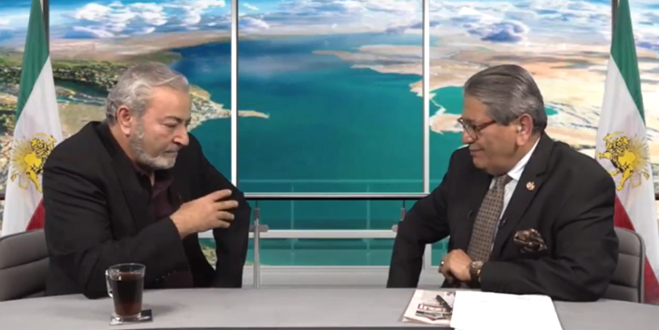
We begin tonight’s edition of A Window to the Fatherland with Dr. Alireza Nourizadeh reading one of his poems from the book of his collected works.
Dr. Alireza Nourizadeh:
We continue the program with paying tribute to the memory and works of the late legendary Iranian woman singer Mrs. Elahe, on this day, the anniversary of her death.
In that resect we dedicate tonight’s program to a friendly talk with another Iranian famous singer, Sattar, who has kindly accepted our invitation to appear on tonight’s program.
Dr. Alireza Nourizadeh:
Do you have any memory of meeting or working with the late Elahe?
Sattar:
Yes indeed I do. I remember that during the early days of the revolution one night she came to my house with Shahrokh and Mohammad Haydari and we all sang until early hours of the following day.
I had listened to her singing in Saghi Studios where she was practicing with the legendary singer Akbar Golpayegani.
Dr. Alireza Nourizadeh:
Thank you for joining us tonight. How do you feel about Iran’s situation these days?
Sattar:
This criminal and ignorant regime has only one mission and that is to make sure that it destroys our motherland. At times I am sick and tired of politics and just want to sing for our people.
Dr. Alireza Nourizadeh:
Your voice and songs are an inspiration to our youth, especially when you sing about the state of our motherland. You are a professional singer who has turned his hair into grey by going through years of artistic performances for your Iranian compatriots.
Sattar:
I always wanted to become a classical singer but ended up becoming a pop singer.
Dr. Alireza Nourizadeh:
How much did you know the late Heideh?
Sattar:
The first time I performed at the imperial court I met her and after I sang sheadvised me not to close my eyes during singing and I said to her why did you focus on my eyes instead of listening to my voice?
Then later the late Shah summoned me and told me that he liked my Life Song and if I could sing it again for him.
The Empress Farah always liked my Wandering Life song and I always had to sing it twice every time I performed at the imperial court.
On one occasion the late Shah asked me if I were from the northern city of Ramsar and I told him that I was only a student there. Then the Empress told the Shah “we must watch this young man, he will become a famous singer soon!”
 khalijefars News, Blogs, Art and Community
khalijefars News, Blogs, Art and Community








